Looking for Lorraine: The Radiant and Radical Life of Lorraine Hansberry by Imani Perry

This is a #longread review due to the brilliance of the subject and the biographer. For those unfamiliar with Lorraine Hansberry, she was the first African American female to have a play performed on Broadway. That play was A Raisin in the Sun which highlights the lives of Black Americans living under racial segregation in Chicago.
The book is SO good that as soon as I finished reading it, I wanted to start from the beginning again and stuff myself full of the language, insights, stories, and depth of humanity that Perry taps in depicting Hansberry and the backdrop of the times, the struggle, the gains, and sometimes the glory.
Hansberry died of cancer when she was 34, yet she crammed so much experience into her short life, while connecting with some of the best minds, revolutionaries and radical visionaries of the time. Early on she was influenced by Sean O’Casey where she wrote: “…The play was Juno and the Paycock, the writer Sean O’Casey – but the melody was one I thought might have been sung in a different meter…. a melody that I had known for a very long time.” Hansberry was also influenced profoundly by W. E. B. Du Bois – and she kept this quote close, “Somehow you have got to know more than what you experience individually.”
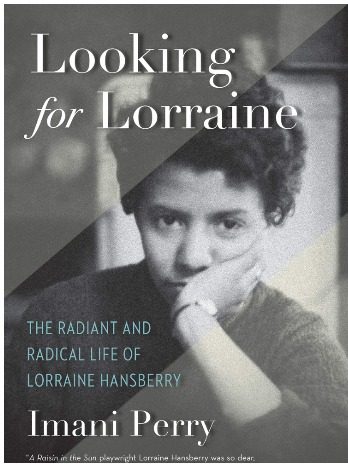
Hansberry was equally fierce with those whom she thought wasted an opportunity or contorted an issue, such as her critique of the Beat writers – “They have made a crummy revolt; a revolt that has not added up to a hill of beans….I accuse them of betraying Bohemia and its only justification.” Essentially, she accused them of being arrogant and racist and losing the important opportunity their profile and influence accorded.
Hansberry’s best-known play, A Raisin in the Sun, was equally embraced and derided by critics. These differing impressions were best captured by her close friend, James Baldwin, and one of her harshest critics, Amiri Baraka:
James Baldwin – “I had never in my life seen so many black people in the theater. And the reason was that never in the history of the American theater had so much of the truth of black people’s lives been seen on the stage…But in Raisin, black people recognized the house and all the people in it.”
Many years later, Amiri Baraka wrote:
We missed the essence of her work – that Hansberry had created a family on the cutting edge of the same class and ideological struggles as existed in the movement itself and among the people. What is most telling about our ignorance is that Hansberry’s play still remains overwhelmingly popular and evocative of black and white reality, and the masses of black people dug it true…it is Lorraine Hansberry’s play which, though it seems conservative in form and content to the radical petty bourgeoisie…is the accurate telling and stunning vision of the real struggle.
Perry tracks Hansberry’s friendship with James Baldwin in passages that capture the intimacy of their connection:
Jimmy wasn’t going to marry Lorraine. But he did lead her down an aisle of sorts. And she did the same for him.
(James Baldwin) “…Then she would walk into the kitchen, saying, with a haughty toss of her head, “Really Jimmy, You ain’t right, child!” With which stern put down she would hand me another drink and launch into a brilliant analysis of just why I wasn’t “right.” I would often stagger down her stairs as the sun came up, usually in the middle of a paragraph and always in the middle of a laugh. That marvelous laugh. That marvelous face. I loved her, she was my sister and my comrade.”
Hansberry also hung out with Nina Simone, knowing she could learn a lot from her. (Nina Simone) “Lorraine was definitely an intellectual and saw civil rights as only one part of the wider racial and class struggle…” Perry writes, ‘Nina was a model of extreme discipline, one who composed music in her head nonstop. But Nina’s discipline wasn’t about restraint and closing off the imagination of the ranging and raging desires, aesthetics and interests. It was a discipline that allowed for creative expansion. Her disciplining was vivid and on fire rather than punishing. For Lorraine, who had often castigated herself for having too many ideas and running in too many directions at once, Nina had to be inspiring.’
Perry also writes about Hansberry’s belief that African Americans ought to attract global attention to their plight and inspire a mass organization of black people to organize in acts of mass disobedience. She had a bold vision and was fearless in standing up for what she believed. In one of the most arresting passages in an utterly compelling book, Perry shares this scene:
In response to the unrest in Birmingham, the Attorney General (Robert F Kennedy) called James Baldwin and other prominent Black people, and a few liberal white people, to meet with him quietly. The energy of that time in history is important to understand. That year, Baldwin was touring the South and said, “There is, I should think, no Negro living in America who has not felt, briefly or for long periods, simple, naked, unanswerable hatred…Lorraine also felt this rage. Though the meeting began quietly, things heated up when Jerome Smith (Southern freedom movement organizer and founder of the New Orleans chapter of the Congress on Racial Equity) asked about the government’s real role in Birmingham. He implied that they were insincere with respect to protecting the civil rights of African Americans. Having faced the violence of the white South with no assistance from the federal government, Jerome had an empirical basis for this feeling. Jimmy recalled that “Bobby – and here I am not telescoping but exercising restraint – had turned away from Jerome as though to say, “I’ll talk to all of you, who are civilized. But who is he?”
And then she unleashed. Recalled Baldwin, “Lorraine said (in memory she is standing, but I know she was sitting – she towered, that child, from a sitting position). ‘You have a great many very accomplished people in this room, Mr. Attorney General, but the only man you should be listening to is that man (Jerome Smith) over there.’ That is the voice,’ she added after a moment during which Bobby sat absolutely still staring at her, ‘of twenty-two million people.’
Perry ends this luminous book with the following passage:
The best words I ever read in memoriam of Lorraine are the words that keep me writing, not just about her but in her wake and light. They are words for all of us to remember her by, and to become and eventually perish and persist by too:
She had said part of what she had to say, but there were other words burning inside of her so I wonder, as she takes her place in the great beyond, was she supposed to say it all or just put the lights on so that someone else might now step from the wings and continue the dialogue….
Freedom is a constant struggle: Ferguson, Palestine, and the foundations of a movement
by Angela Y Davis
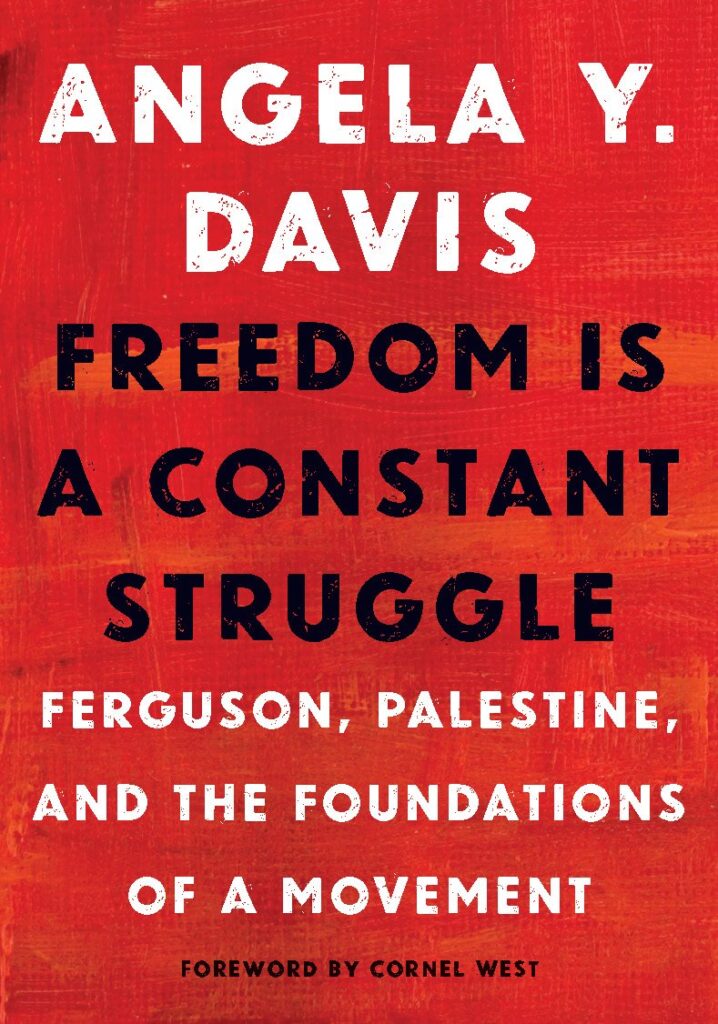
If you want to understand how movements are kindled, sustained and strengthened then read this book. As a fearless activist, Angela Davis is the high priestess of movement building and, as she observes in this book, ‘Movements require time to develop and mature. They don’t happen spontaneously. They occur as a result of organizing and hard work that most often happens behind the scenes. Davis traverses a lot of terrain in this hip-pocket book, from the role children have played in sustaining movements (aka Birmingham, Alabama where children faced down police dogs and firehoses) to the rise of Black Lives Matter and the #Me Too Movement.
In reflecting on the power of movements, Davis says, ‘What has kept me going has been the development of new modes of community. I don’t know whether I would have survived had not movements survived, had not communities of resistance, communities of struggle survived…It is in collectivities that we find reservoirs of hope and optimism.’
Davis reminds us that movement leaders draw their strength from the collective activism they fire and inspire. “…we think individually, and we assume that only heroic individuals can make history. That is why we like to focus on Dr. Martin Luther King Jr, who was a great man, but in my opinion his greatness resided precisely in the fact that he learned from a collective movement. He transformed his relationship with that movement.
Davis also calls out a lot of what’s not happening at present and what’s not being said such as the lack of reference to working class people. ‘Among other things, I’m critical of the extent to which our political discourse has become flat. For example, we can’t even talk about working-class people anymore. When did everyone become “middle class”? And even those of us who might objectively be “middle class” can still identify with the working class. There’s something wrong with the fact that we cannot talk about the working class.’
What’s needed, Davis argues, is progressive and transformative activism. And here she reminds us of the principle associated with Dr. Martin Luther King Jr, ‘which should be the slogan of all our movements.’ “Justice is indivisible. Injustice anywhere is a threat to justice everywhere.
Strength in What Remains: A Journey of Remembrance and Forgiveness
by Tracy Kidder
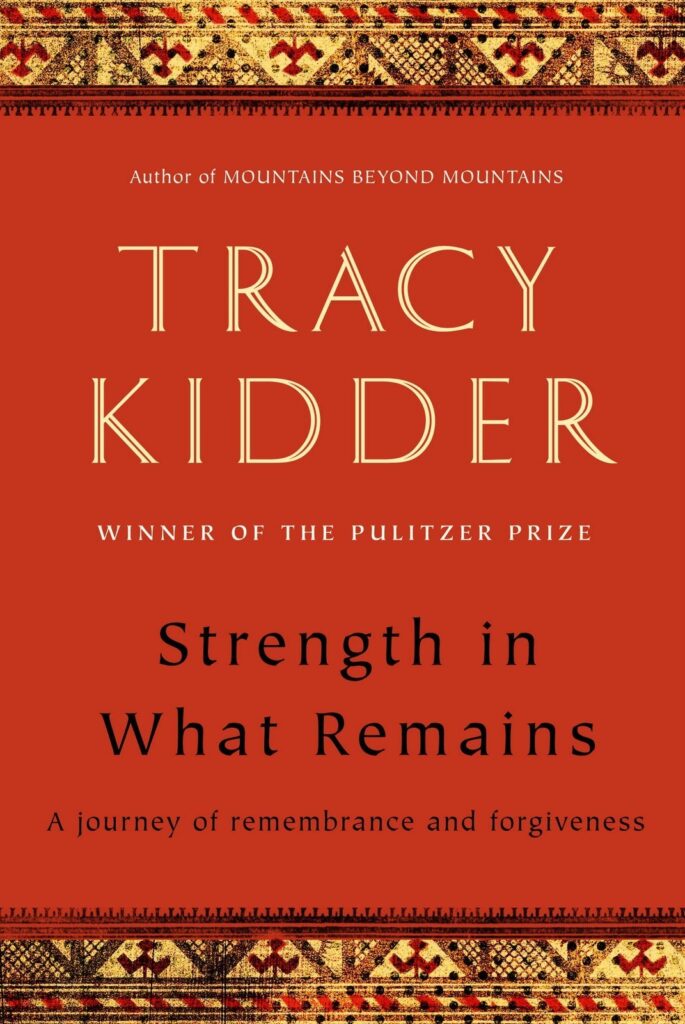
Kidder is renowned for his stories of inspiring people and organizations and this book is no exception. While he was writing his 2003 bestseller, Mountains Beyond Mountains, about the life of Dr Paul Farmer and his organization, Partners in Health, he met Deo, an African refugee who was helping at the organization. Kidder became riveted by Deo’s story and this book is the result. It tracks Deo escaping Burundi in 1994 at a time when Burundi and neighboring Rwanda were torn apart by civil wars, and where Hutu and Tutsi were massacring each other. Deo finally manages to escape to America and, with $200 and no English, his survival on the streets of New York leads to a combination of generous strangers and benefactors whose support mingles with Deo’s own grit, tenacity, hope, and vision.
Eventually Deo is supported to study to become a doctor and to intern at different organizations, and that’s where Kidder finds him where Deo has offered his services to Partners in Health. And so begins the second half of the story where Kidder and Deo retrace Deo’s journey from Burundi to America, and the horrors he experienced, in a story that unravels the past to make sense of the present day. Kidder provides a frame to the sustained structural violence Deo was subjected to on multiple levels in Burundi until he managed his escape to the United States by drawing on the work of Burundi scholar, Peter Uvin. Uvin also explains the differences and similarities in the violence experienced in Burundi and Rwanda:
‘The Rwandan genocide was a carefully planned case of scapegoating, launched by a government of the majority against a powerless minority. Burundi’s mass violence was an ethnic civil war between a minority government and rebels drawn from the majority, a war between two equally powerful armed factions. In Rwanda, ordinary people killed mainly out of prejudice. In Burundi, it was mainly out of fear. These were different catastrophes, Uvin insists, not to be conflated. But they had essential ingredients in common: “Social exclusion and the ethnicization of politics…are the two central elements to violence conflict in Burundi and Rwanda that, like electrons, spin around a core of mass poverty and institutional weakness.’
For me, one of the most moving passages in the book is the story of a Hutu woman (Deo was Tutsi) who encountered Deo near death along a path where people were on a forced march by the militia men. This woman, a stranger who had no obligation to Deo, cajoled him to stay alive and walk with her which he did until they reached the checkpoint where Hutus and Tutsis were being separated, Tutsis to their death. In the retelling of this story by Deo to Kidder, here the woman “loosened the cloth of her outer dress, and then as she began to refasten it, she dropped a fold over Deo’s left forearm and hand and quickly untied the piece of black cloth. Then she put her arm around Deo again and walked on with him a little way. Another group of militiamen passed by. They stopped her and Deo…” What are you doing? You belong over this way.” They pointed to the main group of refugees, milling about in the field.
“Oh, I just want to find a seat,” said the woman. “My son is sick.”
“Are you Hutus?”
“Yes. Of course.”
“Over there.” They pointed toward that main group and turned away.
The woman walked Deo a little further on, then whispered to him, “Genda!” “Run!”
He obeyed. He ran to the crowd, the human forest, the only hiding place in sight. It was the last time he saw her.
Re-read: A Sand County Alamanac: And Sketches Here and There
by Aldo Leopold
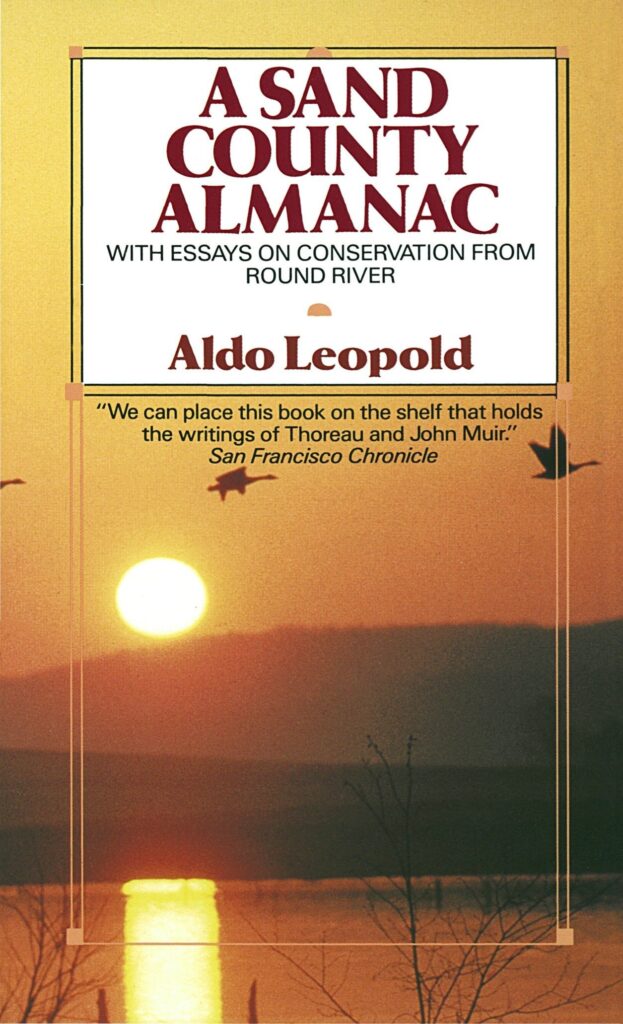
Hands down one of the best environmental books ever written, alongside Thoreau’s On Walden Pond, Rachel Carson’s Silent Spring and Annie Dillard’s Pilgrim at Tinker Creek. It was time to re-read it. The book comprises a series of essays and illustrations written by Leopold in celebration of the land surrounding his home in Sauk County, Wisconsin. The book also makes the case for a land ethic that defines the responsibility we have for the land we inhabit, including this memorable quote: “A thing is right when it tends to preserve the integrity, stability, and beauty of the biotic community. It is wrong when it tends otherwise.”
Bella! Ms. Abzug Goes to Washington
by Bella Abzug

I wanted to learn more about Bella Abzug’s life due to my deep respect for the organization she founded, Women’s Environment and Development Organization (WEDO). So, I clicked on Bella Abzug in the library catalogue and up popped this book! I had no idea! And what a fabulous find it was. Written with Bella Abzug’s acerbic wit and energy, it’s a rollicking read from the time she assumes political office to the abrupt end to her political experiment a year later. And then, after leaving formal office, she directed her attention to organizations and causes that benefited from her networks, knowledge, experience and fearlessness as an activist, a role she sustained for the rest of her life.
From the moment she was sworn in as the volatile Representative from Manhattan she acts. ‘After I recited the pledge, I gave a speech and then went back to the Floor where, as my first official act, I dropped a resolution in the hopper calling on the president to withdraw all American armed forces from Indochina no later than July 4 of this year (1971). Twenty-eight other Congressmen and Congresswomen co-sponsored the resolution with me. As far as I’m concerned, ending this dirty immoral (Vietnam) war is the most urgent thing this Congress has to do….can you imagine telling us to rejoice because only forty American kids a week are getting killed over there now…Well, if he thinks he’s going to get away with it, he’s nuts. Whether he knows it or not, the people are against him. They’ve had it. And so have I.’
Abzug shares plenty of advice for would-be politicians, as relevant today as it was then: ‘I feel if you’re going to be a pathfinder, you have to fight, as I did, for a seat on a committee that has no liberals on it because that’s where you’re going to have most impact.’
‘My New York office is in the process of putting together what I feel is the broadest package of community services ever offered by a member of Congress. It includes – operating right out of my offices – a legal guidance center, a Social Security guidance center, and a consumer information service. This is what it means when I say I’m an activist. You do while you’re trying to show people that something can be done.’
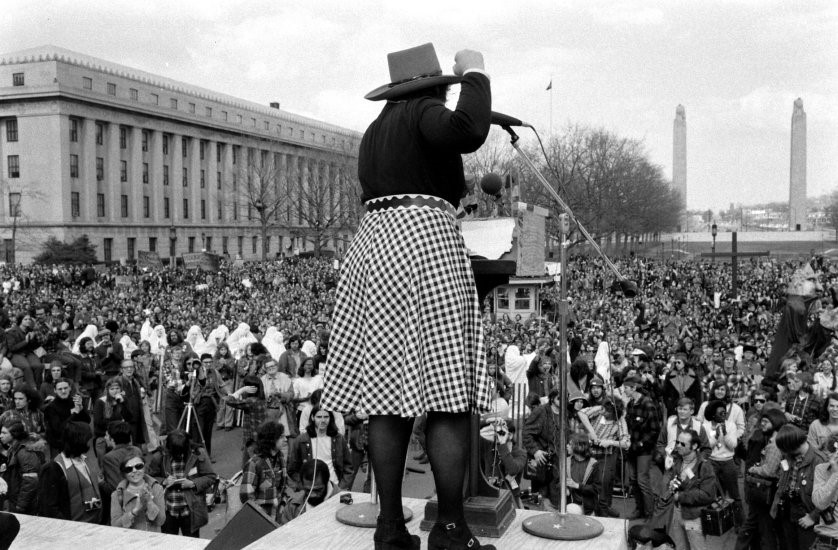 In this spirit, her speech to the formation of a National Youth Caucus, a gathering of three thousand young people from across America, is classic Abzug. She tells them she was happy they were not giving up and she invokes their collective activism to be inside the political system “ripping off” a piece of the power structure all for themselves.
In this spirit, her speech to the formation of a National Youth Caucus, a gathering of three thousand young people from across America, is classic Abzug. She tells them she was happy they were not giving up and she invokes their collective activism to be inside the political system “ripping off” a piece of the power structure all for themselves.
And at the same time, she makes a call to action for women to assume political office:
‘Now some fifty years after we’ve won the right to vote, women are finally beginning to realize that we haven’t begun to learn how to use it. Most women, to the extent that they’re involved at all in the masculine political structure, are still kitchen slaves. We ring doorbells, stuff envelopes, distribute leaflets, lobby, parade, demonstrate. We find ourselves relegated to the drudgery, the dirty work, the detail work of politics. It’s outrageous! Just imagine for a moment what life in this country might have been like if women had been properly represented in Congress.’
Looking back over the year, Bella Abzug asks reflectively, ‘is there anything I would have done differently? No. If anything, I should have done more of it.’
She Said: Breaking the Sexual Harassment Story that Helped Unite a Movement
by Jodi Kantor and Megan Twohey
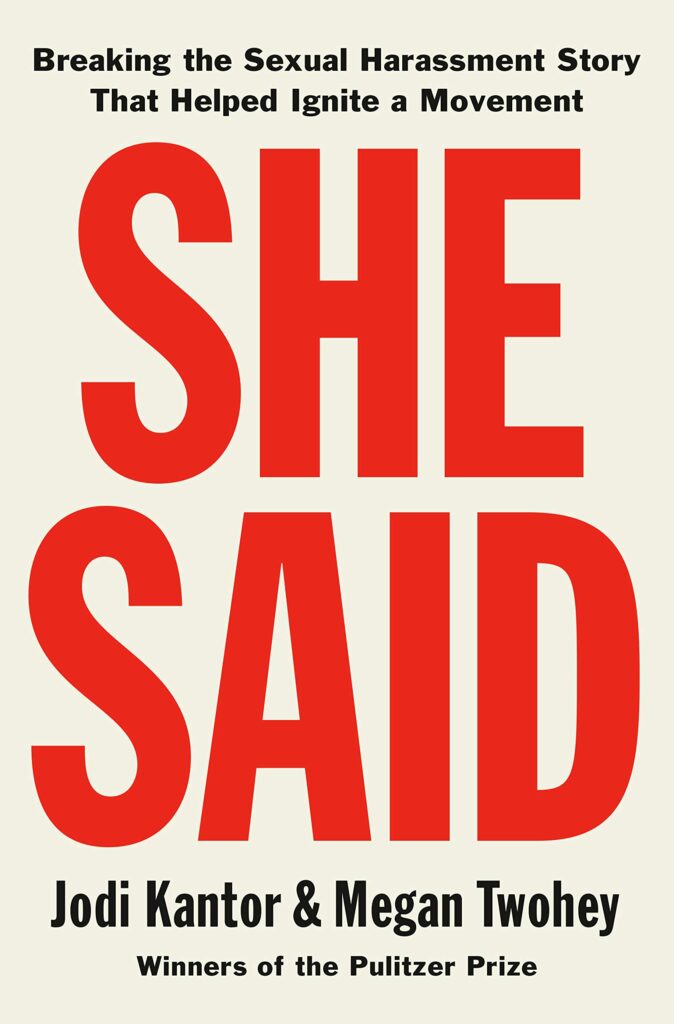
This is the kind of book you pick up and put down again a day later after you’ve read through the night in thrall of the telling. There must be a movie in the making as the story is compelling, vivid, and urgent. It’s not surprising that the issue and the book have been compared with Watergate and All the President’s Men. One led to the resignation of a President, the other to the rise of a movement for justice and the fall of many perpetrators.
It’s the story of how New York Times reporters, Jodi Kantor and Megan Twohey, (together with Ronan Farrow in the New Yorker), scooped the Harvey Weinstein sexual abuse allegations that fueled the #MeToo movement and the outing and firing of many high profile figures as well as the high stakes drama of the Brett Kavanaugh hearings for the Supreme Court role. It’s also the story of coverups, systemic harassment, hush money, corrupt lawyers, the cost of silence, loss of self-esteem, income, confidence.
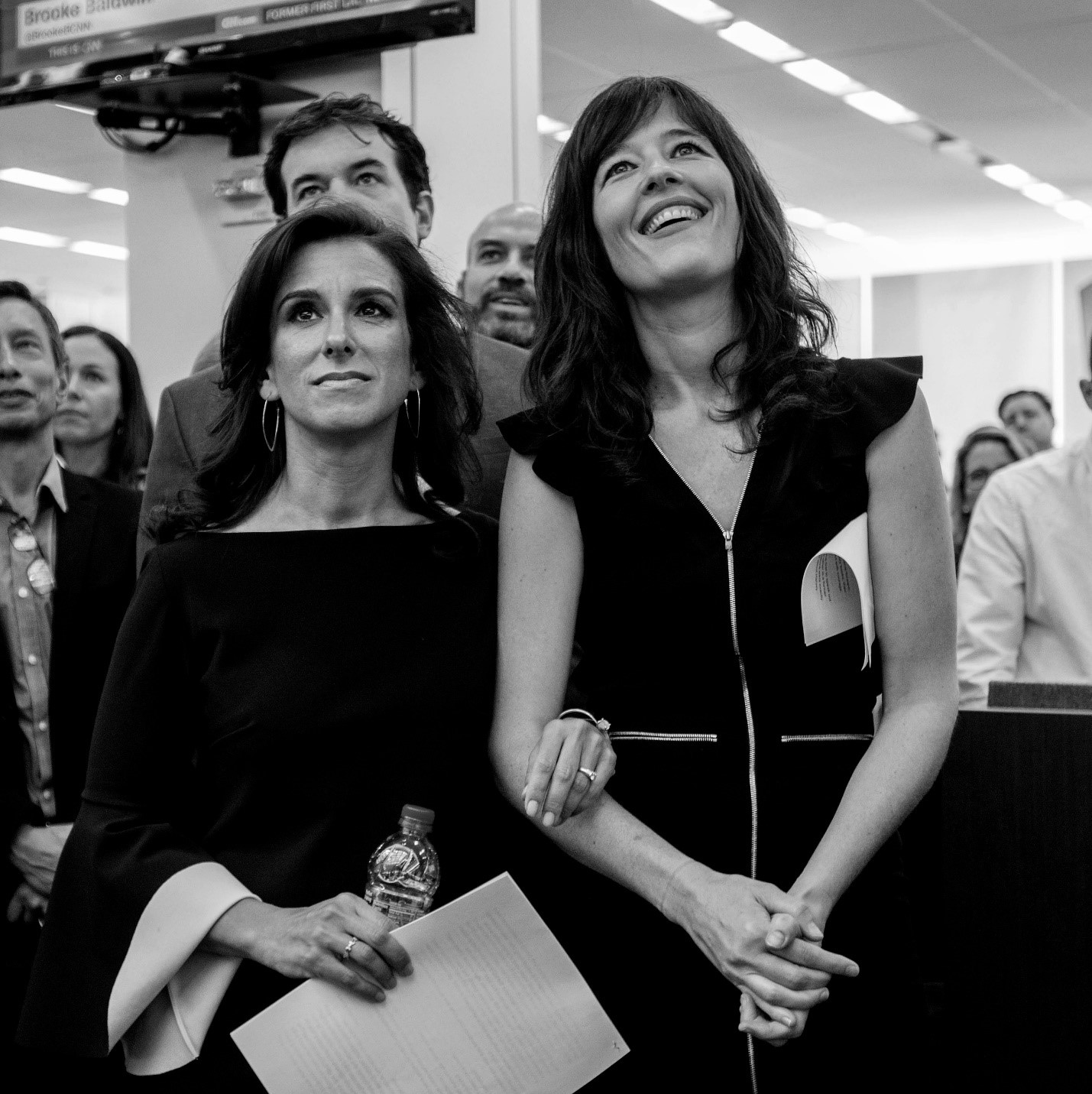 Like “All the President’s Men” the story begins with a small incident. In this case, it’s a tweet from actor Rose McGowan claiming that she had been raped by a Hollywood producer. What makes a difference this time is that it’s a story pursued by two investigative journalists with a reputation for advocating for women’s rights, and with the resources of The New York Times backing them, refuse to let go of the story and follow their leads.
Like “All the President’s Men” the story begins with a small incident. In this case, it’s a tweet from actor Rose McGowan claiming that she had been raped by a Hollywood producer. What makes a difference this time is that it’s a story pursued by two investigative journalists with a reputation for advocating for women’s rights, and with the resources of The New York Times backing them, refuse to let go of the story and follow their leads.
It’s a lesson in the practice of investigative journalism as much as in how power is wielded, and silence secured in relation to sexual harassment, abuse and rape. There’s also a Deep Throat of sorts in the story and many sheroes. The standout for me is Ashley Judd, for her courage for being the first Hollywood star to go on the record and for her determined distance after the story breaks. She goes walking in the wilderness for days and leaves the social media and news articles behind.
In a month of reading books about movement building and social movements, this book is a classic tale of how two investigative journalists and many brave women (and a few brave men) helped propel a #MeToo movement for justice that is unstoppable.
On the Marsh – A Year Surrounded by Wilderness and Wet
by Simon Barnes
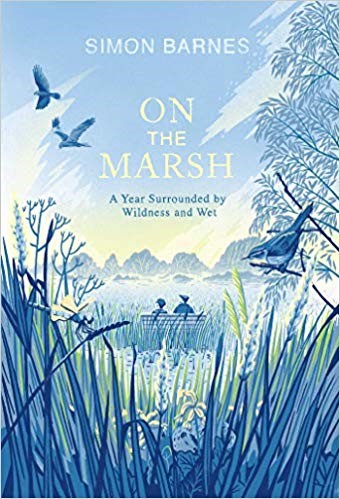 I loved this book for its humanity and honoring of the more than human world.
I loved this book for its humanity and honoring of the more than human world.
I loved it too for being a love story of sorts for Barnes’s younger son, Eddie, who happens to be autistic.
‘Eddie, my younger son…loves nature with a sense of driving, inspiring joy. He also loves nature as a thing we share. What does a buzzard eat? Where do ducks sleep? What do bats do in the day?’
‘Eddie and I took an after-school stroll onto the marsh. Apple juice for him, a beer for me, that sort of stroll. We do it quite often. Get used to it: it will become a recurring theme of this book: beer and apple juice and, often enough, baked beans in a jar.’
It seems even more of a great read because, in a move that outraged many readers, Barnes was made redundant from his role as Chief Sportswriter of The Times newspaper, London where he also wrote a wildlife opinion column, and he was finding his way. That he was able to do so with such grace and acceptance is a lesson for all of us when things change suddenly.
Barnes navigates a lot of territory in this book and it’s such a joyful romp. This includes his lament for the lost words ditched by the Oxford Junior Dictionary including ‘adder, heron, kingfisher, minnow, thrush, blackberry, bluebell, bramble and poppy.’ The dictionary then introduced ‘blog, broadband, voicemail, attachment, database, chatroom, bullet point and cut-and-paste.’ Barnes notes a ‘spirited counter-attack in a book called The Lost Words, which celebrates – and attempts to make sure we keep – the words no longer relevant to the dictionary makers.’
As an avid birder, Barnes writes about the benefits of learning birdsong as much as bird behavior. ‘This business of birdsong is an essential part of enjoying the marsh, enjoying the wild world. Or, at least, it is to me. Learning birdsong changed my understanding of the world and its possibilities: it’s not too much to say that. It’s not just that I can tell one species from another without needing to set eyes on them…Rather it’s the sense of connection. It’s like being an insider.’
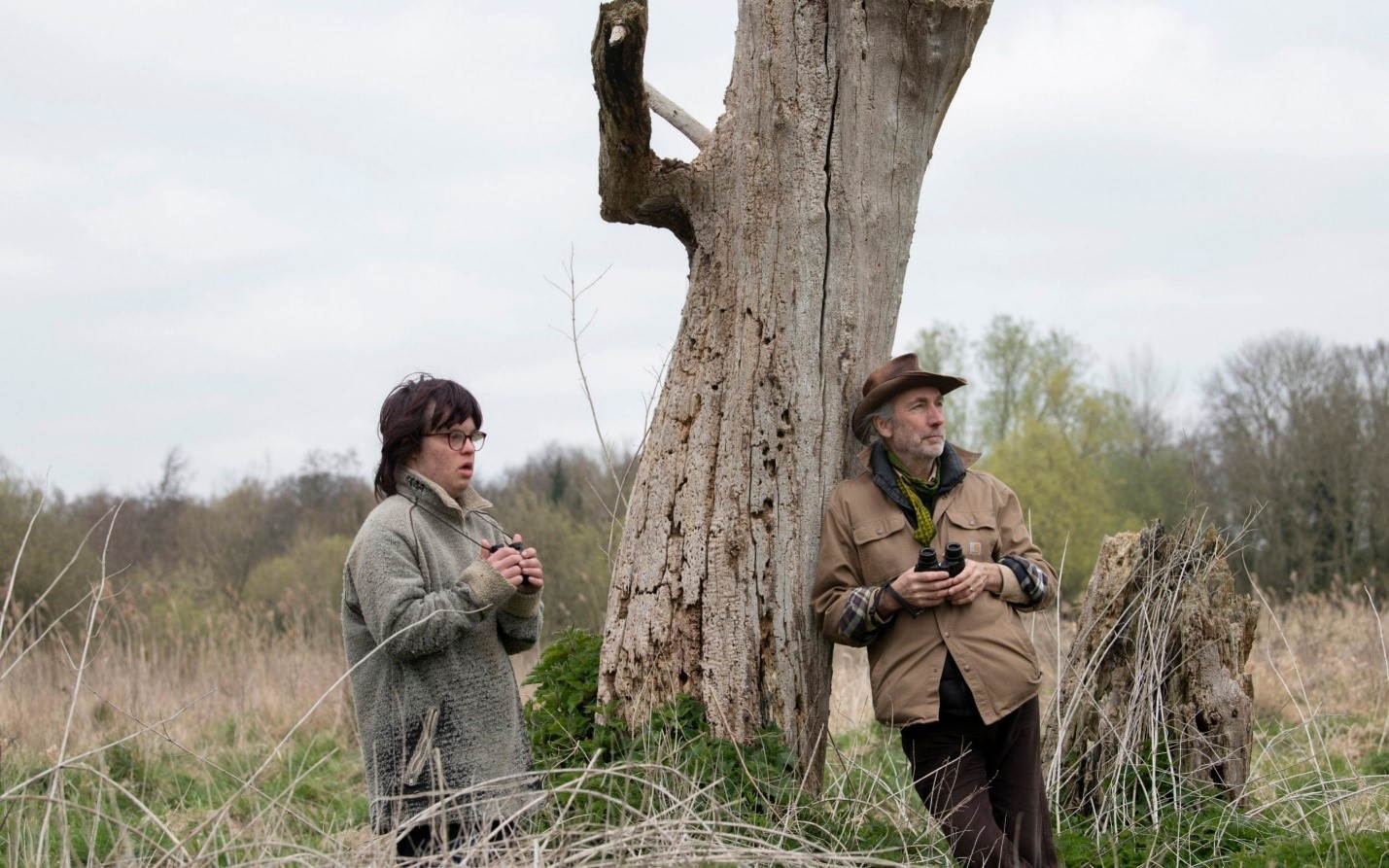 Toward the end of the book, Barnes comes full circle in his telling. ‘The year was turning, the autumn jobs were in full and urgent spate, and Eddie was a part of it, locked into the natural rhythm of the world.’
Toward the end of the book, Barnes comes full circle in his telling. ‘The year was turning, the autumn jobs were in full and urgent spate, and Eddie was a part of it, locked into the natural rhythm of the world.’
Barnes goes on to share final words relayed from Cindy (his soul partner and Eddie’s mother). ‘She came downstairs – Eddie apparently asleep before she reached the landing – to report he had said something significant.’
‘I love my life.’
Erosion: Essays of Undoing
by Terry Tempest Williams
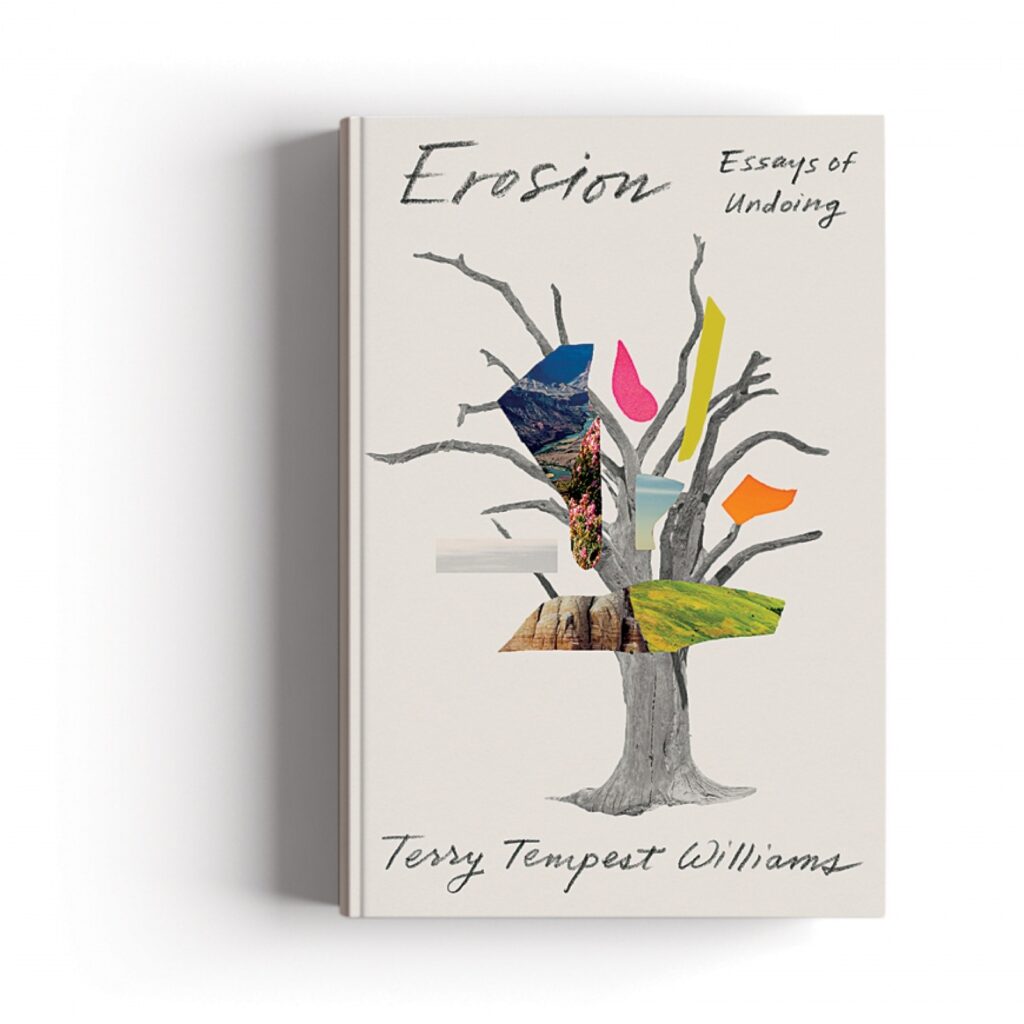
I heard Terry Tempest Williams speak at the stunning Bioneers conference a couple of weeks ago and then immediately went and bought her latest book before departing for Vietnam for work. This was the book I needed to read with its focus on what we’re losing, of what’s eroding as a result of climate change, politics, loss of hope, safety, democracy, self, and home.
And with its equally powerful focus on wild lands and creatures, a belief system rooted in ‘a cosmology of care and the sanctity and adaptive intelligence of evolution’. There is a Quaker phrase, this person speaks to my condition, and this seems true for me of Terry Tempest Williams. Her writing, equal part vulnerable and steady, feels true. It’s writing from the bones and a clarion call in a time of climate emergency.
2 Responses
Jane, what an amazing book list! Your reviews inspire a new round of book buying and I can’t wait to dig in. Thank you for sharing.
Dear Michele, thanks so much for your comment! I’d love to catch up again if you’re headed to San Francisco at any point? Warmest regards Jane